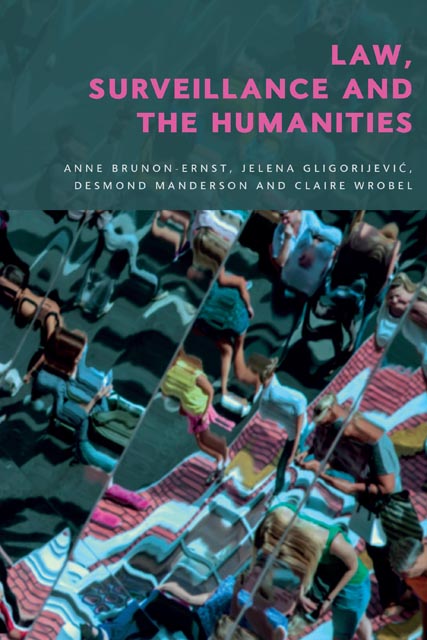10 - Black Futures Matter: Racial Foresight from the Slave Ship to Predictive Policing
Published online by Cambridge University Press: 18 November 2023
Summary
I arrive slowly in the world; sudden emergences are no longer my habit. I crawl along. The white gaze, the only valid one, is already dissecting me. I am fixed. Once their microtomes are sharpened, the Whites objectively cut sections of my reality. I have been betrayed. I sense, I see in this white gaze that it's the arrival not of a new man, but of a new type of man, a new species. A Negro, in fact!
Frantz Fanon, Black Skin, White MasksI. Post-Panopticism and the Visualisation of Race
Fanon's analysis speaks to the ineradicable synecdoche of seeing race. Upon entering the white field of vision, in Fanon's analysis, a Black man's opaque skin reflects every other Black man like himself – past, present and future.1 He can no more be denuded of this epidermal mirror than he can shed his own skin. Fanon is fixated by a white gaze that he can sense and see; the white watcher does not have to be directly before one's eyes to do its work of dissecting. The conquering gaze could also inhabit a camera, or it may survey Black emergences indirectly by data gathering, statistics and prediction. What all these microtomes have in common is their inbuilt perception of blackness as a distinguishing category of experience that holds unspeakable dangers and must therefore be controlled and contained through permanent surveillance.
In his dread of being watched by a white observer – what we may call his racial scopophobia – Fanon articulates a deeply rooted pathology of American anti-Black racism. As I suggest in what follows, throughout the history of surveillance in the United States, suspicious blackness has provided an expedient template for determining who should look – or, as the case may be, point the camera – at whom. Consequently, any subversion of this template – the amateur video showing four LAPD officers brutally beating Rodney King, or sousveillance projects today – is automatically remarkable. So much so that it is easy to forget that no a priori surveillance system has ever demonstrated non-white subjects to be unrulier than the general population and thus in need of greater surveillance efforts; race was the reason why certain subjects were surveilled at all, in the firm expectation that they were inherently suspicious and thus susceptible to disorderly behaviour.
- Type
- Chapter
- Information
- Law, Surveillance and the Humanities , pp. 193 - 215Publisher: Edinburgh University PressPrint publication year: 2023



